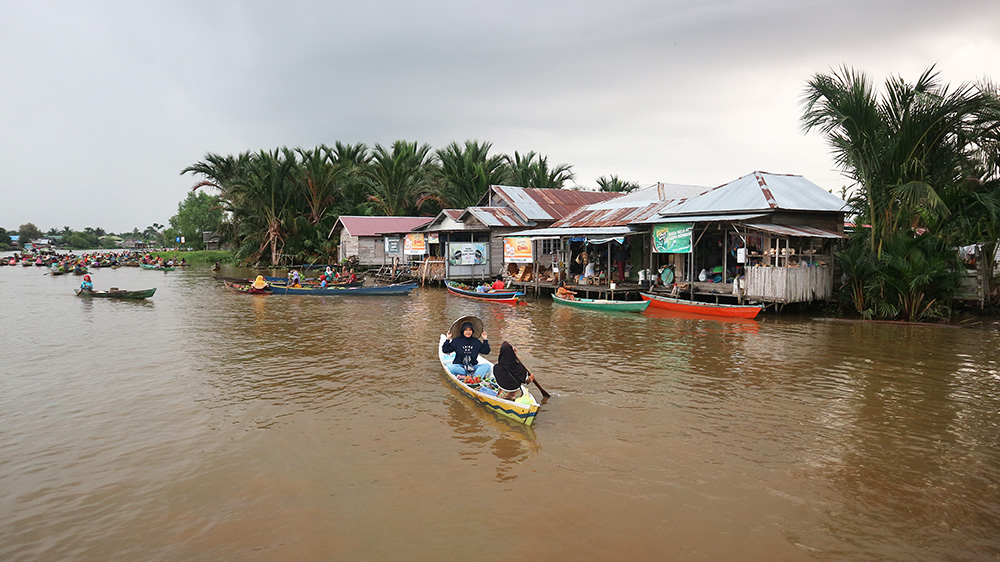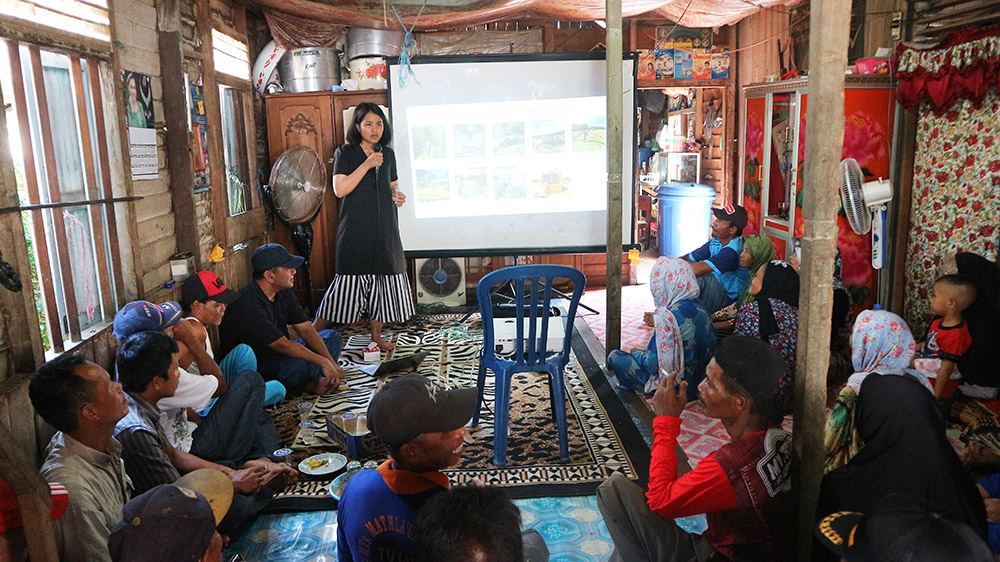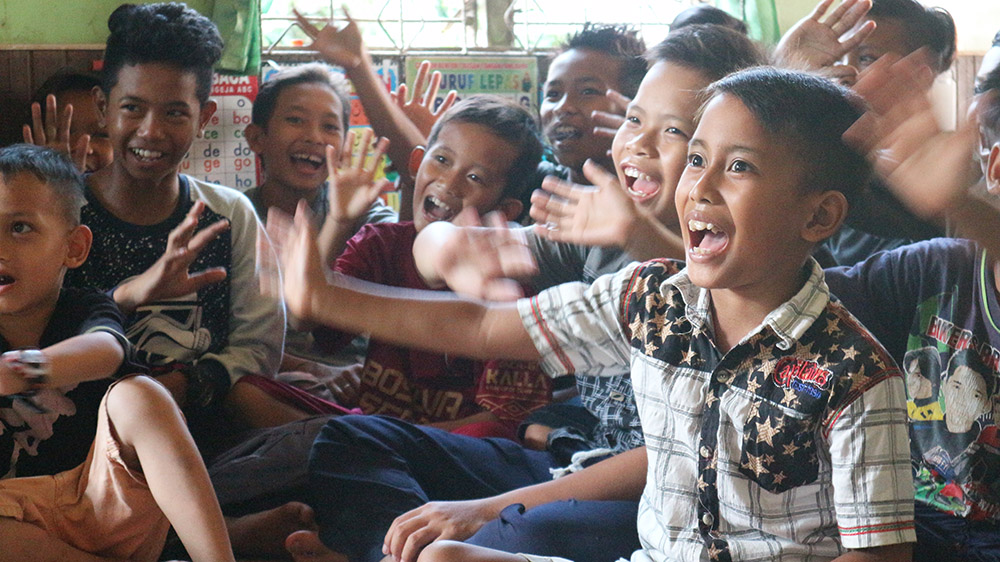
Not many people have ever heard of Muara Pulau Village. Hidden in a remote part of South Kalimantan Province in Indonesia along the Barito River, it takes a flight, a 4.5 hour drive and a boat ride on a small ‘klotak’ to reach from Jakarta. To the rural villagers, a major metropolis like Jakarta seems like a world away, yet the products that they contribute to are found on shelves stretching from Paris to New York.
The villagers of Muara Pulau, like many other small rural villages in Central and South Kalimantan and Sulawesi, live in poverty. Their livelihoods depend on the harvest of rattan, a naturally grown vine that is used for furniture and other household items. Often, whole families are involved in the many steps needed to prepare the rattan for collection such as washing, smoking, frying, drying, bundling, sorting and transporting.
When our local project team visited Muara Pulau to carry out a series of training activities it wasn’t our first time there. We’d previously visited Muara Pulau and numerous other villages to conduct a child rights risk assessment for a client whose supply chain was linked to the rattan there, directly and indirectly. That assessment confirmed that children often help their families with work, and that there’s a high risk of children dropping out of school to work.

Photo: The Centre’s team on the way to a rural rattan-producing village to carry out training activities for workers, children, and sub-supplier representatives. Travelling by boat is often the only mode of transport between villages
This risk is further amplified by the fact that Muara Pulau doesn’t have a senior high school. Those who want to attend have to travel for an hour by boat to reach the school. There’s no access via land. Before the pandemic, one farmer we spoke to estimated that only 25% of poor families can afford to send their children there. With rattan farmers falling deeper into poverty during this pandemic, it is likely that far fewer children can afford to go to school there now.
When we visited Muara Pulau the second time round we had a new goal: to train the community, particularly the parent workers and the supplier representatives, on child rights knowledge and awareness as part of a pilot project. The aim was to help them understand the risks when children get involved in work at a young age, to see the bigger picture of how they fit into the global supply chain, why it’s important to consider the wellbeing of children in the rattan communities and to discuss the kind of support needed to safeguard the children.
In total, 85 rattan harvesters, washers and farmer co-ordinators from three different villages attended training sessions that provided tips on children’s basic rights, education, and the role of parents in keeping their children safe and away from child labour. For the rattan farmers that took part in the training, this was a unique but welcome activity. Despite contributing to a global supply chain, they had never had an opportunity to avail of a brand-sponsored training before.
“No one has ever asked us [rattan farmers] to join a training like this, not even the village government. I hope you will come back again and teach us something else. I am happy to be able to take part in an activity other than my daily routines,” said a male rattan harvester from Muara Pulau Village.

Photo: The Centre trains local villagers on child rights
The training also included representatives from the local sub-suppliers – a reflection of the brand’s commitment to address risks and support workers in the deeper supply chain. Like the farmers, the sub-supplier representatives had also never received child rights-related training before and did not understand how the child rights risks at the raw material sites implicated the supplier and ultimately the brand. Understanding of child rights issues improved significantly after the training, and it also sparked sub-suppliers to think of ways to improve the livelihoods of villagers.
“The earning from rattan is not enough. The needed support for rattan farmers are skill training and business capital support to improve their economic situation,” said a rattan sub-supplier in Muara Pulau Village.
Beyond Muara Pulau Village, we also travelled to Ketab Village in Central Kalimantan Province, where villagers and sub-suppliers took part in child rights training for the first time.
“I think parents contribute to children’s involvement at work. We need to educate the parents to be more sensitive to children’s rights. I will also consider your suggestions to support children in my area such as providing school supplies or transportation allowance,” said a representative from a sub-supplier in Ketab Village, Central Kalimantan Province.
A further 110 children of farmers took part in separate awareness sessions in the various villages we visited that taught them about the importance of education and staying away from hazardous work. These training sessions combined activities, story-telling and music to create a fun learning experience.

Photo: Children from the rattan community take part in a fun training to increase their awareness of child rights issues
“I want more stories from Sister Rona [one of the facilitators of the children’s session]. I like singing with her too. It was fun,” said an 11-year-old girl from Dadakitan Village in Central Sulawesi Province.
From Muara Pulau to Ketab to Dadakitan Village, the training reached rattan communities and sub-suppliers in some of the most remote areas in Indonesia. The participants were grateful for the opportunity to learn but most importantly, the training improved their knowledge on key child rights issues including child labour, and triggered important discussions on strengthening support for these communities, thereby paving the way towards continued engagement and support. Encouragingly, the experiences from this pilot project have been taken up by the client, and a new phase of the programme has just been launched. This new phase involves establishing a robust and sustainable child labour prevention and remediation system.
This training was also a good example of an international company extending their sustainability efforts beyond the first tier. The rattan communities we visited make important contributions to the global supply chain (as do many other communities in rural agricultural settings around the world); it is important that they are not overlooked and that companies continue to support them.
By using this website, you agree to our use of cookies. We use cookies to provide you with a great experience and to help our website run effectively.